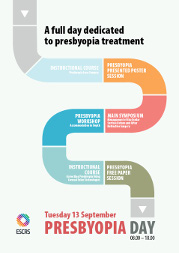Posters
Plateau iris syndrome: case series
Poster Details
First Author: A. Pantalon ROMANIA
Co Author(s): D. Branisteanu A. Cantemir D. Chiselita C. Feraru
Abstract Details
Purpose:
We present two case reports of plateau iris syndrome in young patients who requested ophthalmologic consult by chance
Setting:
'Sf. Spiridon' University Hospital, Ophthalmology Department
Methods:
Review of patient charts with plateau iris syndrome diagnosed clinically and gonioscopically by anterior chamber angle clossure due to a large cilliary body or due to its anterior insertion that altered the position of iris periphery in respect to the trabecular meshwork ('double hump' sign). Laser iridotomy was performed both therapeutically to remove the relative pupillary block and to establish the difference between plateau iris configuration and plateau iris syndrome.
Results:
Acute angle closure was first treated with topical and systemic IOP lowering medication and when a satisfactory IOP level was achieved, we performed laser peripheral iridotomy along with an argon laser peripheric iridoplasty. Pilocarpine 2% was instilled for the next 3 months after the laser procedure with positive outcome as the IOP was efficiently controlled. Long term both patients were withdrown from Pilocarpine or any other topical medication for lowering IOP.
Conclusions:
Surgical management is the primary treatment in patients with plateau iris configuration or syndrome. A patent iridotomy may be therapeutic in reducing risks of angle closure. However, in some patients, laser iridotomy may not significantly alter the anterior chamber depth or anatomy. Argon laser peripheral iridoplasty (ALPI) is the procedure of choice to effectively open an angle that remains occluded after successful laser iridotomy. It is highly effective, and the effect is maintained long term. Gonioscopy is mandatory also in long term evaluation for correct monitoring.
Financial Disclosure:
NONE





